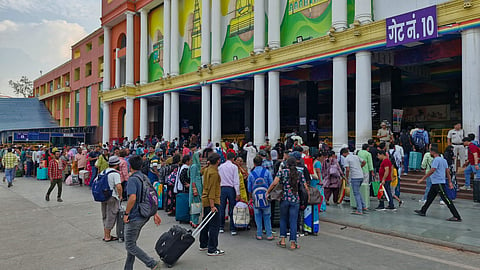

Despite a wave of flight and train cancellations triggered by rising tensions between India and Pakistan, Delhi's transport hubs maintained an outward calm. However, beneath this composed facade, anxiety simmered as travellers navigated tough choices and growing fears of a potential conflict.
At Indira Gandhi International Airport, where more than 130 flights were cancelled on Thursday, passengers queued up silently, glued to airline websites and social media for real-time updates. Authorities responded promptly, ensuring smooth crowd control and reinforcing security across terminals.
“There was no chaos, thankfully,” said Manas Kulhad, a corporate professional flying out for work from Terminal 3. “But there’s always that fear at the back of your mind. I just hope no drone or missile attack happens when I’m in the plane. This is a work trip. I have already cancelled my vacation plans,” he added.
Security was visibly heightened, with armed personnel stationed throughout the airport. Passengers underwent multiple layers of checks. Yet, despite the increased vigilance, there was no panic. Movement remained brisk and orderly, though tension was evident on many faces.
Similar scenes played out at the New Delhi Railway Station. Long queues formed outside as heightened security checks slowed the entry process. Passengers and porters rushed across platforms to avoid delays, but order was maintained.
"We were a little afraid of having to make this journey during such an emergency, but we didn’t have much of a choice. But to our relief, the situation seems to be completely under control and there is no panic situation here,” said Shweta Jaiswal, a passenger travelling to Lucknow.
For many, though, the risk proved too much.
“I had planned a weekend trip to Amritsar with my family, but given the current tensions, we decided to cancel. Safety comes first,” said Amit Mehra, a software engineer from Noida.
The travel disruptions follow the deadly 22 April terror attack in Pahalgam, which has fuelled both diplomatic and military strain between the two countries.
Workplaces across the NCR also responded swiftly. Many implemented early leave policies and introduced flexible work-from-home arrangements.
“Our office allowed us to leave early today. The atmosphere is tense, and commuting feels risky. Everyone’s on edge,” said Alok Tarafdar, a PR professional at a Delhi-based firm.
The usual office chatter has shifted. In cafeterias, WhatsApp groups, and metro compartments, talk of the looming threat of war has overtaken everyday gossip.
“There’s an eerie tension even in the office. We are all pretending it’s business as usual, but deep down, everyone’s worried. I have had colleagues bring up things like stocking essentials for emergency situations," Tarafdar added.